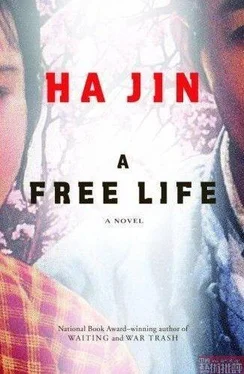Heidi was impressed by Nan 's ability to fix small things. He had always changed the oil in his car and replaced the battery by himself, and once even repaired the rear brake of Nathan's bicycle. The previous winter he had replaced the toilet flapper to stop a leak in the bathroom next to the kitchen. Pingping was pleased by his handy-manship and praised him. Back in China he had been a clumsy man and couldn't even patch a flat bicycle tire, which most men could do. In their neighborhood he was known for being lazy. He wouldn't do any housework and instead raised four doves, which were snow-white and lovely, each wearing a brass whistle on its wing, so they'd emit a fluty sound when flying. Several times the wives in the neighborhood complained to Pingping that their husbands had begun to emulate Nan and had stopped doing household chores. They urged her at least to let him wash dishes and his underwear. She promised to make him work, but he seldom lifted a finger to help her. Even Nan 's mother said that if a bottle of cooking oil fell over and spilled, he wouldn't bother to pick it up.
American life had changed him. Now he loved hand tools-oh, the infinite varieties of American tools, each designed for one purpose, just like the vast English vocabulary, each word denoting precisely one thing or one idea. What's more, Nan was always ready to run an errand for his wife, though he still grumbled on occasion. This was mainly due to the job he hated intensely but had to keep. Even he could feel the change in himself. He wasn't a feeble bookworm anymore; he was no longer ashamed of working hard to make a dollar.
NAN and Pingping sometimes quarreled when their son wasn't around. But they had agreed to stay together until Taotao grew up. Nan once asked Pingping, "What will you do after that?"
"Either go to a nunnery or kill myself," she said. Ever since girlhood she had been infatuated with the image of a nun: the long gown, the flying headpiece, the white gloves, the glossy rosary.
"I'll be a monk, then," said Nan.
"Let's go to a temple together so we can often meet. Promise, you'll spend some time with me every week."
Nan always liked her peculiar kind of innocence, and replied, "You're talking as if all the monks will leave you alone."
She punched his arm. "I'm serious."
Nan said no more. How he wished he could work up more emotion to reciprocate her love. If only he weren't so exhausted and so sick at heart. If only he hadn't been wounded so deeply by that fox Beina.
Sometimes when Pingping couldn't stand his impassivity anymore, she'd pick up the phone and call someone. Nan would do the same when he was unhappy. He'd talk with Danning, and most times they'd chat for a long while. His friend would urge him to be more considerate to Pingping. For better or worse, she was willing to sacrifice everything for their family and was absolutely loyal to him. What else could he want from her? Where could he find a better woman? He ought to feel fortunate and grateful.
Unlike Nan, Pingping didn't have a friend of her own. Then who did she call when she was upset or angry? Nan often wondered and got unsettled. Sometimes the instant the line went through, she'd hang up. Once he asked who she was phoning. "None of your business," she said. "I can call anyone I want to."
One evening in mid-April they quarreled again. She dropped his tea mug on the floor. About that he said nothing and just wiped the wet spot on the carpet with a rag. He was afraid she might go so far as to tear one of his books, which she'd done before. Yet today his silence incensed her more. She rushed out of the room, picked up the phone from the top of a wooden chest and began dialing. He followed her out and pressed down the plunger of the phone. She glared at him, her eyes flashing madly.
"Who do you want to speak to?" he asked.
"Leave me alone!"
" No. You must let me know. "
"You never care anyway."
"Please! If you have someone you'd like to meet, I won't hold you back, I promise. Just let me know." He reached for the handset but couldn't wrench it off her hand.
"Let go of me!"
"Not until you tell me who you're calling." "I dialed nobody but 911, all right?" "What?" he gasped. "You're insane!"
The gravity of his voice stopped her. She released the phone, staring at him.
"They may come here with an ambulance," he told her, still in disbelief.
"No, I've never said a word to them. How could they get here?"
"Their machine must show the caller's number, so they can trace you to this place."
That stunned her and she started sobbing. Nan replaced the phone, enfolded her with one arm, and said, "Come, stop crying. Nothing like that has happened yet."
"I really didn't know they could find out I called. I just meant to make you jealous."
Her last sentence surprised him, but also somewhat pleased him. He smiled and told her, "You acted like a small child. All right, no more crying. Don't dial 911 again."
She nodded yes and muttered, "I hate you as much as I love you. If only I could leave and never see you again."
"Just give me some time, okay? I'll find a decent job and then my temper will improve. I'll be a better man."
" You really need to do something to save yourself and our family. We can't continue to live like this."
"I know we can't stay under Heidi's roof forever. I'll figure out a way. "
"You're always a good talker."
"Only in Chinese." He grimaced.
"Remember what you said to me when we first met?"
"What did I say?"
"You said, 'Life is a tragedy, but its meaning lies in how we face the tragedy.'"
" That was just juvenile rubbish I had picked up from reading Hemingway. "
"But I fell in love with you for that. You were a full man then, the first man who ever said something meaningful to me. I had always been angry whenever I was with another man. You were so different from others, but now you've been losing your spirit. You must brace up and save yourself."
"I know I'm just drifting along."
"We must find our way."
Nan nodded without another word. His heart was filled with pain and gratitude. If his wife had been of two hearts with him, this family would have fallen apart long ago. He must find a way to make a decent living and mustn't despair of himself.
PINGPING was mending Heidi's bathrobe in the kitchen while talking with Heidi. On the table were three stacks of laundered clothes she had just folded. Outside, the clouds had broken, electric wires and leafy branches still glistening with rainwater. The lilacs and young dogwood trees had lowered their white and pinkish blossoms in the glowing afternoon sun. Beyond the shrubs two rabbits scampered about, now nibbling grass and now chasing each other. Ping-ping and Nan were both allergic to pollen. Nan was extremely sensitive to oak and dogwood, whereas Pingping didn't know what she was allergic to. She was most miserable in late April, when her nose would dribble and swell and she'd keep a wad of tissue in her pocket all the time. Nan would repeat in English "April is the cru-elest month," though his wife had no idea it was a line of poetry. The previous spring when pollen had set in, they had thought they were suffering from the flu and had taken Tylenol, Bayer, and other cold pills available over the counter, but none of the medicines helped much. Not until mid-May had Nan figured out what it was, but by then the miserable season was almost over for them.
Pingping was glad that a morning shower had washed away a lot of pollen so the air would be somewhat clean for a day or two. She and Heidi had been talking about yesterday evening's quarrel. Heidi told her that Eric, her late husband's younger brother, was a ladies' man, so she wondered if Nan was the same.
Читать дальше












